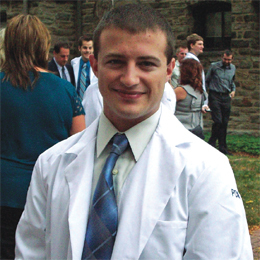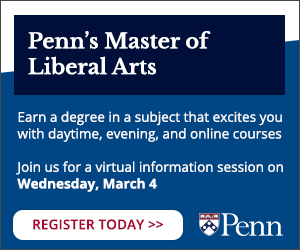
The diagnosis had little impact on Gazzara’s lifestyle, however, and he continued through school with little difficulty. When he decided to pursue a medical career path he faced criticism and discrimination, but kept going. This past spring Gazzara graduated from the Philadelphia College of Osteopathic Medicine (PCOM), a moment he says he’ll never forget. Now addressed as “Dr. Gazzara,” he’s currently a resident in neuromusculoskeletal medicine at Mercy Health Muskegon in Michigan. We talked with Dr. Gazzara about the challenges he has faced and how he hopes his story can inspire others living with vision loss.
On life after the diagnosis…
I really had no other noticeable difficulties when I was first diagnosed. Throughout high school I sat closer to the board, but I still played sports. It wasn’t until college when I had a noticeable difference. Lighting and colors are the biggest difficulty for me. Things look darker for me. Going outside at night is hard because things aren’t contrasted. I am losing my peripheral vision which makes me legally blind, but that doesn’t bother me as much as the lighting.
Using visual aids…
People wanted me to learn Braille early on, but I didn’t want to do it until I needed it, because nothing was really different for me. I didn’t want to change my goals or my life, and I didn’t want to be different. I didn’t see it as being stubborn; I just think I didn’t know what was out there for me. But now what I use all of the time is my computer, phone and iPad which I change the colors on so the background is black and the text is white. That [contrast] changed everything for me. I also use a cane sometimes. People have suggested I get a Seeing Eye dog. I would love that but I think it would make people think I am completely blind. I do well getting around so I feel I don’t need to take that step yet.
Finding a fit in medicine… My goal was always to go to UPenn (University of Pennsylvania). I wanted to do something special and I considered playing for their sprint football team, but by then my vision was getting worse and the game was too fast. But I majored in bio- chemistry and from there I went to PCOM. When I learned about osteopathic medicine it just fit. PCOM was also a very humble place and it was day and night from my experience at UPenn. Everything was more holistic and in-tune with patients. I loved it and had so much fun.
Dealing with doubters…
I think some of my family were worried I would spend money to go to school and not make it or that it wouldn’t work out. Most people encouraged me but I dealt with a lot of stuff people don’t know about. I was told I could never go to med school because of the way I did things, and it still happens today with physicians I meet. They think I can’t do what they do but they don’t think outside of the box. There are other ways to do things; it doesn’t mean it’s wrong.
Becoming a doctor…
Graduation is exciting for everyone but for me there was so much running through my mind when I was walking across that stage, which I did on my own to show everyone I can still do it. The fact that I’m addressed as “Dr. Gazzara” and how deep it runs inside me that I did it is huge. It fu- els me and it was a great feeling.
Being more hands-on with patients…
There isn’t much I’ve encountered that I can’t do when it comes to treating patients. The hardest thing is looking in someone’s ears, mouth or eyes because you can’t touch it, but the routine stuff, listening to the heart and lungs, feeling the stomach, I can do. I can give injections, but detailed procedures or surgeries I’m not able to do.
The field I’ve chosen is all musculoskeletal which is very hands-on, feeling a patient’s back, arms, legs, the tone of their muscles. People assume you have to see if someone is struggling or uncomfortable [when they walk] but you can hear it. I pick up on it by listening and paying attention. My own experiences come into play when I’m working with patients. I can understand them on a different level and give advice that has helped me, whether it’s websites or adaptive equipment.
Published (and copyrighted) in South Jersey Magazine, Volume 13, Issue 6 (September, 2016).
For more info on South Jersey Magazine, click here.
To subscribe to South Jersey Magazine, click here.
To advertise in South Jersey Magazine, click here.












